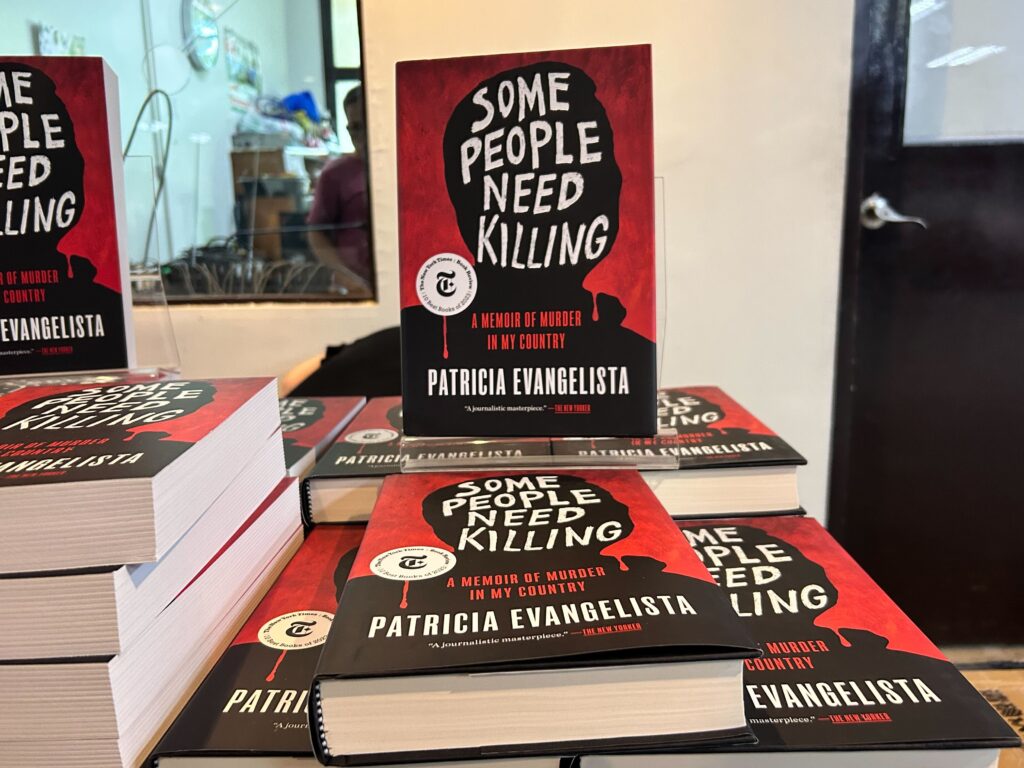
Some People Need Killing, a memoir of murder by Patricia Evangelista. CDN Digital photo | Niña Mae Oliverio
CEBU CITY, Philippines — “I cannot write what I cannot see and I cannot make people feel what I cannot imagine.”
These were the words last Monday, April 22, of Patricia Evangelista, a trauma journalist and a former investigative reporter of a Philippine news company during the Philippine tour of her book, “Some People Need Killing”.
In her book tour on Monday at the University of the Philippines Cebu, Evangelista discussed her experiences as a journalist under the Duterte regime, especially on how she was able to manage covering trauma.
READ MORE:
PNP will not enforce arrest warrant for Duterte if ICC issues one
Drug war won’t end with Duterte in jail
Unfazed Bato dela Rosa, Rodrigo Duterte on looming ICC ruling: ‘Walang kaba, walang pakialam’
The ‘Some People Need Killing’ documents the accounts of the victims of extrajudicial killings and is also dedicated to the survivors of the drug war under the administration of former President Rodrigo Duterte from 2016 to 2022.
“Every day, for a period of a little more than seven months beginning in 2016, the Philippine Daily Inquirer maintained what it called the Kill List. It was a public record of the dead, fed by reports of correspondents across the country…,” reads a portion of the prologue.
Published in 2023, Evangelista’s memoir of murder was among the top 10 best books of 2023 by the New York Times; and the New Yorker’s David Remnick described it as “a journalistic masterpiece.”
Keeping a record of traumatic accounts
Recalling her writing process, Evangelista said that “easy-reading is the hardest kind of writing.”
“For something this grim and this brutal, it is left to the writer to make it as easy for the reader to go from sentence to sentence because it is very easy to close a book,” she said.
She said that she tried to use the shortest sentences or smallest possible words given that the story she is about to tell is already brutal on its own.
“There’s no need for adverbs, for adjectives, and flowers. I hope it succeeded. I hope people saw what I saw,” Evangelista said.
Patricia Evangelista signs a copy of her book at UP Cebu. CDN Digital photo | Niña Mae Oliverio
Being the reporter on the field who witnessed first-hand the traumatic events, Evangelista warned that, for some, it would be a difficult read as those stories were stories that actually happened in real life.
“A traumatic incident is not the fundamental of a human being. It is one terrible moment in their lives,” she said.
Moreover, Evangelista also believes that there is “an enormous value” to “keep a record” of all the tragic happenings which are now part of Philippine history.
Writing a memoir of murder in her motherland was her way of resistance, she said.
Creating an impact
It is now up to the readers on how the book would shape their opinions and stances. Evangelista said that she does not know the “individual impact” of the book she wrote.
“Certainly, I don’t know if that impact extends to the results of an election,” she said.
She said that she only wrote the record, and what would happen after would depend on how everyone else would read the rest of the story.
She added that her book was just a “small fraction” of what actually happened in the drug war.
Evangelista hopes that when people read the book, they would try to discern how the subjects came up with their decisions and choices; because they are not just “other people.”
Moreover, Evangelista admitted that there were some individuals who had reached out to her for a possibility of making a film out of the book, but she politely declined.
“I believe this is the sort of story that demands careful handling. The faith lies between myself and my sources, so I am not comfortable giving it into someone’s hands. There are many people who can tell the story. There are many talents out there. For this medium and this story, I think it belongs to the written book,” the journalist said.